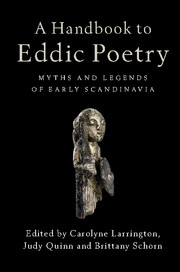Book contents
- Frontmatter
- Contents
- List of illustrations
- List of contributors
- Translations and abbreviations of the titles of eddic poems
- Introduction
- 1 The transmission and preservation of eddic poetry
- 2 Traditions of eddic scholarship
- 3 The editing of eddic poetry
- 4 The dating of eddic poetry
- 5 Eddic performance and eddic audiences
- 6 Eddic poetry and mythology
- 7 Eddic poetry and the religion of pre-Christian Scandinavia
- 8 Eddic poetry and heroic legend
- 9 Place names in eddic poetry
- 10 Eddic poetry and the imagery of stone monuments
- 11 Eddic poetry and archaeology
- 12 Eddic modes and genres
- 13 Eddic metres
- 14 Eddic style
- 15 Kennings and other forms of figurative language in eddic poetry
- 16 Alliterative lexical collocations in eddic poetry
- 17 The representation of gender in eddic poetry
- 18 The reception of eddic poetry
- Consolidated bibliography
- Index
7 - Eddic poetry and the religion of pre-Christian Scandinavia
Published online by Cambridge University Press: 05 August 2016
- Frontmatter
- Contents
- List of illustrations
- List of contributors
- Translations and abbreviations of the titles of eddic poems
- Introduction
- 1 The transmission and preservation of eddic poetry
- 2 Traditions of eddic scholarship
- 3 The editing of eddic poetry
- 4 The dating of eddic poetry
- 5 Eddic performance and eddic audiences
- 6 Eddic poetry and mythology
- 7 Eddic poetry and the religion of pre-Christian Scandinavia
- 8 Eddic poetry and heroic legend
- 9 Place names in eddic poetry
- 10 Eddic poetry and the imagery of stone monuments
- 11 Eddic poetry and archaeology
- 12 Eddic modes and genres
- 13 Eddic metres
- 14 Eddic style
- 15 Kennings and other forms of figurative language in eddic poetry
- 16 Alliterative lexical collocations in eddic poetry
- 17 The representation of gender in eddic poetry
- 18 The reception of eddic poetry
- Consolidated bibliography
- Index
Summary
The eddic poems have traditionally played a significant role as sources for historians of religion concerned with the pre-Christian religion of Scandinavia. Most of the Nordic sources can be divided into ‘contemporary’ (archaeological evidence, a few skaldic poems, runic inscriptions, and a few other categories) and ‘medieval’ (sagas, the works of Snorri, and much more). Whereas the first category, in a sense, can be said to be reliable, it usually requires a great deal of interpretation in order to be used in our reconstructions of the pre-Christian world-view, and the information it offers constitutes only bits and pieces of this world-view. In general, it can be said that without taking the later medieval material into consideration, our reconstructions of pre-Christian religion would be very limited. The medieval material, on the other hand, can usually be dated to at least a couple of centuries after the official conversion of the Nordic countries, and most of the medieval sources were written down by Christians, which naturally affects their reliability with regard to earlier beliefs. In contrast, the eddic poems (at least in most cases) are believed to have originated in the pagan period, although they are preserved in medieval manuscripts. They thus offer a good deal of information, although there is far from as much as could be wished for (see below). For this reason they have occupied a unique position within the history of scholarship, and they have been used, for instance, to evaluate the sources from the second category and to suggest interpretations of the first. This summary of the source situation is of course very simplified in relation to the actual ‘state of the art’ within Old Norse studies, including the history of religions, but it encapsulates the important problems that we face in our investigations of the pre-Christian religion of Scandinavia. Consequently, this chapter will examine some of the problems associated with the use of the eddic poems in our attempts to reconstruct the pre-Christian religion of the North. I shall begin by identifying these problems, then go on to point to some possible strategies that may help us to address them, and, finally, as an example of what can be done, briefly analyse the poem Hyndluljóð, in order to argue that it is possible to use an eddic poem to illuminate our knowledge of the pre-Christian religion.
- Type
- Chapter
- Information
- A Handbook to Eddic PoetryMyths and Legends of Early Scandinavia, pp. 132 - 146Publisher: Cambridge University PressPrint publication year: 2016
- 1
- Cited by



